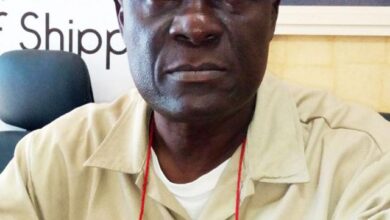B’Odogwu: Nigeria Customs Digitisation Evolving for Optimum Efficiency, Requires Stakeholders’ Patience – Chukwuma, NAGAFF Chieftain

Chief Afam Chukwuma, Deputy National President, Seaport of the National Association of Government Approved Freight Forwarders, NAGAFF spoke on the Unified Customs Management System in Lagos saying the system is showing prospects of improvement daily
The Managing Director of International Supply Chain Systems Ltd, a foremost freight forwarding company in Nigeria also called for stakeholders understanding while seeking urgent intervention to ameliorate the effects of losses caused by demurrage and penalties paid to terminal operators and shipping companies
(Q) Tell us about your impression of customs modernisation in Nigeria.
Over the past few years, we’ve witnessed consistent and commendable improvements in Customs modernisation. I can confidently say that the Nigeria Customs Service (NCS) stands out as the most progressive government agency in terms of digitising its processes and operations. This transformation has been remarkable, especially considering how far we’ve come from the days of manual operations to today’s fully digitised systems.
Before now, we all recall the days of Preshipment Inspection and later Destination Inspection. Back then, everything was done manually, with physical documents moving from one desk to another. However, Customs has evolved significantly from ASYCUDA, to ASYCUDA++, then to NICIS, followed by NICIS II, and now, we’re in the era of Bodogwu. This digital journey has redefined how Customs operates across the country.
Today, every Customs process from job releases to data entry and clearance is handled online. Everything is interconnected. Whatever happens at a command is monitored in real time at the headquarters. I remember visiting the office of the ACG in charge of Trade and Tariff (T&T) earlier this year. I spent about 30 to 45 minutes there and was able to witness, in real time, how payments and transactions were being captured across various commands.
There’s no need for physical files or official dispatches between commands. Unlike other agencies of government where correspondence between headquarters and field commands still depends on manual dispatch or courier, Customs operates entirely through its integrated digital platform.
If Lagos Command needs to interact with Ogun Command, it’s just a matter of logging into the system. The recipient sees the message immediately and can respond accordingly. This seamless communication model is a testament to how far Customs has come in embracing digital innovation.
Thanks to these improvements, trade facilitation has become much more efficient. Of course, like any new technology, there are always initial glitches and teething problems. That is expected. We’ve seen it happen with other innovations too. Even in my company, we launched our customised ERP platform “ISCS Oshimili”. It took about six months of back and forth with the developers before it stabilised. During that period, it was difficult. My staff were frustrated and began to lose confidence in the system. But we remained committed, continued giving feedback, and once the system became perfect it transformed our operations.
Today, ISCS Oshimili allows our clients to track the status of their shipments without even needing to call us. All they need is their Bill of Lading or reference number. Once a file is created in the system, clients with login credentials can check updates in real time. We ensure every job gets updated at least twice daily. What a client sees in the morning is not what they’ll see in the evening it reflects the progress on each consignment. And as MD, I can work remotely and monitor all activities from anywhere in the world. This is the power of digital transformation.
Even global companies like Toyota have faced challenges with new innovations. There was a time they had to recall vehicles over a brake system error. But they fixed it, and customers regained confidence.
I remember when Nigeria transitioned from RAR to PAAR. It wasn’t easy. There were delays, congestion, and system failures. But eventually, we overcame those challenges. Today, no one complains about PAAR. That’s why I believe we must support the Bodogwu system, remain patient, and give Customs the time and support needed to stabilize the platform.
That said, I am not denying that there are challenges especially painful delays that freight forwarders and importers are experiencing due to the system migration. I have personally appealed to the Comptroller General of Customs to consider introducing palliatives or compensation mechanisms to show empathy and support to stakeholders during this period. We appreciate the effort he’s already making.
Just last week, during our meeting with the CGC in Apapa, we raised our concerns particularly regarding demurrages. The CGC immediately responded and has since engaged the Executive Secretary of the Nigerian Shippers’ Council. Discussions are ongoing with shipping companies and terminal operators on the possibility of extending free days .
I am aware that the technical team is working round the clock, and I must commend their efforts. It’s encouraging that when we raise specific complaints, those issues are often resolved within a week or two. This feedback response cycle shows a commitment to progress.
(Q) So how would you rate Customs’ response to user complaints on a scale of 1-100?
It’s important to note that experiences with the Bodogwu system vary from command to command. While I personally do not handle much volume at PTML, I have colleagues who operate there and report minimal issues with the system. According to them, the B’ odogwu desk officers at PTML Command are responsive and effective in resolving challenges. Some believe this is due to the lower traffic compared to Apapa, which handles a significantly higher volume. Nonetheless, even at Apapa, despite the heavier workload, officers are doing their best to attend to users and resolve issues as they arise.
From my perspective and understanding of technology and system capacity I would say the Customs team is performing above average. PTML could be rated around 90%, while Apapa, given its volume, might fall between 70%. The CGC himself is working tirelessly because his reputation, integrity, and years of service are on the line.
That’s why I urge all stakeholders importers, freight forwarders, and licensed Customs agents to be patient and continue providing feedback. At the same time, Customs must remain accountable by addressing issues promptly and transparently. They should also consider temporary compensations or alternatives to cushion the impact during this transition period.












One Comment